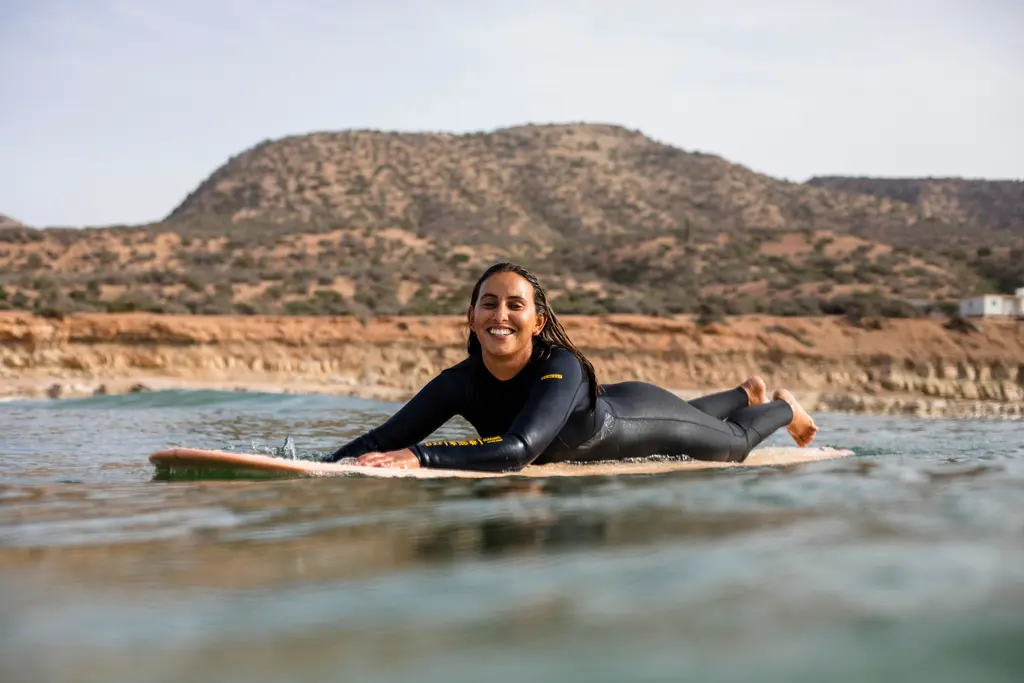Shark attacks Mick Fanning during a surf comp. But do we have ourselves to blame?
- Text by Michael Fordham

Surfing hardly ever makes the national news in UK. Once in a while a monster swell hits these islands. There’ll be a smattering of badly informed surfploitation pieces in the mainstream press and on the BBC. But when an unsuspecting shark poked its pointy nose into the final of the J-Bay Open and tickled former world champ Mick Fanning in the ribs, we had to be prepared for a perfect storm of mainstream hackery.
And the newly formed, allegedly fracking-funded World Surf League must be rubbing their hands with glee at the spectacle of Julian Wilson and ‘Manly’ Mick Fanning shrugging off a live-streamed attack. Gazillions of views. An acreage of follow-up column inches. Spikes in viewing figures for the next round on the tour.
The alarmist headlines, though, come at the height of a thread that’s been running through surfing lately – call it galeophobic or galeophilic. If you’ve even paddled out in zones where the men in grey suits have been known to strike you will have come across people who love to tell shark story, musing on the statistical likelihood or otherwise of coming to blows with the apex predator of the deep.
Controversy has been raging especially hard in South Africa these last few years. SA has of course seen an unprecedented rise in Shark tourism. These days its easy. You can pay a man to lower you down in a cage and check out the beasties for cash up close and personal. To attract the monsters of the deep a practice known as ‘chumming’ has been growing – where shark bait in the form of offal and other cuttery from the fishing industry is weighed out the side of boats. The idea is of course that tourists paying hard cash for their once-in-a-lifetime shark perving spectacle need to get the goods, like, now. Our long-evolved fishy friends have in turn associated the unguent effluent of chum with the presence of humans as well as a rare and hard-to-find food source. It’s hardly surprising, then, that – along with other environmental factors like rising sea temperatures – there has been, according to some reports, a blatant and alarming rise in the shark attacks.
It’s open-season, in other words, on shark hate as well as shark bait.
Organisations that care for the ocean environment, and who, unsurprisingly are often staffed by passionate surfers and other ocean users, are therefore caught on the horns (or should we say teeth) of a tricky dilemma. We want to be able to use the oceans safely. But we also don’t want to oppress and endanger species that cruise the beaches and points and river mouths of the world, and have done so for aeons.
A casual trawl through the webs will reveal a complex truth – that though shark attacks on humans, particularly surfers, are desperately rare compared to the amount of sharks we kill and cull for sport and food.
Whatever side of the debate you find yourself, stone me if I’m not going to go and buy a pair of Mick Fanning board shorts after this recent showdown. Coming to you soon with extra room for those unflappable cojones.
Enjoyed this article? Like Huck on Facebook or follow us on Twitter.
You might like

Maryam El Gardoum is breaking new shores for Morocco’s indigenous surfers
The Amazigh Atlantic — Through her groundbreaking career and popular surf school, the five-time Moroccan champion is helping women find their places in the waves.
Written by: Sam Haddad

Volcom teams up with Bob Mollema for the latest in its Featured Artist Series
True to This — The boardsports lifestyle brand will host an art show in Biarritz to celebrate the Dutch illustrators’ second capsule collection.
Written by: Huck

A new documentary spotlights Ecuador’s women surfers fighting climate change
Ceibo — Co-directed by Maddie Meddings and Lucy Small, the film focuses on the work and story of Pacha Light, a wave rider who lived off-grid before reconnecting with her country’s activist heritage.
Written by: Hannah Bentley

The rebellious roots of Cornwall’s surfing scene
100 years of waveriding — Despite past attempts to ban the sport from beaches, surfers have remained as integral, conservationist presences in England’s southwestern tip. A new exhibition in Falmouth traces its long history in the area.
Written by: Ella Glossop

In Queens, local surfers are moulding a neighbourhood in their own renegade images
Rockaway breaks — On a little-known stretch of beach in eastern New York City, an ecosystem of wave catchers, and the local bars and restaurants that fuel them, is seeing a boom. Paolo Bicchieri meets the residents and business owners behind the growing swell.
Written by: Paolo Bicchieri

The Chinese youth movement ditching big cities for the coast
In ’Fissure of a Sweetdream’ photographer Jialin Yan documents the growing number of Chinese young people turning their backs on careerist grind in favour of a slower pace of life on Hainan Island.
Written by: Isaac Muk

